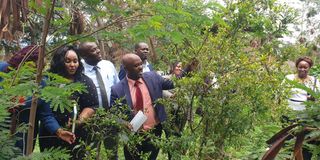Ensure only safe pesticides are used, Nakuru MCAs urge state

Members of the Nakuru County Agriculture Committee tour a food forest run by Seed Savers Network at the shores of Lake Elementatita in Gilgil.
What you need to know:
- They want Parliament to come up with a bill which regulates importation of pesticides and insecticides in the country.
- The 27 MCAs had toured SSN to learn about agro-ecology and the benefits of organic farming towards enhancing food safety and security.
- Gathanwa said farmers should ensure that they cultivate safe produce for their own consumption as well as for sale.
Regional lawmakers in Nakuru County want the national government to conduct a search on all illegal pesticides and hold their sellers accountable.
Further, they want Parliament to come up with a bill which regulates importation of pesticides and insecticides in the country, and ensure only the safe ones find their way into the country.
They were speaking earlier in the week while touring Seed Savers Network (SSN) at the shores of Lake Elementatita in Gilgil, Nakuru. SSN is a grassroots organisation working with over 60,000 farmers to conserve agrobiodiversity by strengthening communities' seed systems for improved seed access and enhanced food sovereignty.
Led by former Nakuru County Assembly chairman of the Agriculture Committee Wilson Mwangi, the 27 MCAs had toured SSN to learn about agro-ecology and the benefits of organic farming towards enhancing food safety and security.
Dumpsite
“Seemingly, Kenya has become a dumpsite for whatever farm chemicals are manufactured elsewhere and cannot be used there as they are hazardous,” said Mwangi, who is also the MCA for Menengai East ward.
He decried the increasing cases of cancer and subsequent deaths, saying use of harmful farm chemicals, exceeding maximum residual levels (MRLs) and failure to observe pre-harvest intervals were major contributors.
His counterpart from Eburu Mbaruk Ward Michael Gathanwa called on farmers to embrace organic agriculture as a way of enhancing food safety and security.
Use indigenous seeds
“It is time to rethink the way farming is done, and the change has to start with use of indigenous seeds and application of organic inputs,” said Mr Gathanwa.
Synthetic farm inputs, he added, have become a menace to the country, and a threat to lives.
He said farmers should ensure that they cultivate safe produce for their own consumption as well as for sale. Some notorious producers though, are known to spray produce for sale with harmful chemicals and spare what is consumed at home.
“What such farmers forget is that the produce they spray with harmful chemicals end up being consumed even by their own children, unknowingly, in the urban areas,” said Daniel Wanjama, a coordinator at SSN.
“Food safety is a collective responsibility, starting with farmers who must produce food free from harmful residuals,” Mr Wanjama said.
As a grassroots organisation, Wanjama said, SSN is seeking to work with the county government of Nakuru in ensuring there is reduction on resources spent on seeking medical services by promoting production and consumption of safe food.
Produce safe food
If communities embraced production and consumption of safe food, he noted, they would be wealthier and have more money to spend on needs such as education.
“We are seeking to work with the county agriculture committee to formulate laws for testing vegetables in the markets in a bid to ensure what is sold in Nakuru is safe for consumption,” said Mr Wanjama
Some people, he noted, are gradually avoiding consuming vegetables such as tomatoes owing to the intensive spraying of the crop in the farms. Some common delicacies such as tomato salad, commonly known as kachumbari, are gradually losing presence on tables due to fear of consuming harmful pesticides.
Ironically, Mr Wanjama noted, the chemicals are imported, sometimes from countries where their use is banned.
Often, Kenyan farmers are keen on observing food safety measures for produce meant for the export market, he said, adding that, unfortunately, produce found unsuitable for consumption in export market often finds its way into local markets, putting consumers’ health at risk.





